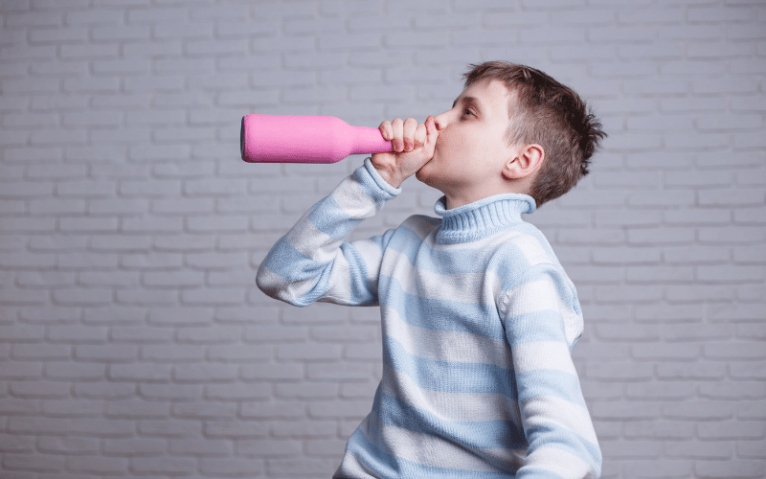Alcoholism, like addiction, is a progressive disease. The progression means that many potential alcoholics display alcoholic tendencies from a young age, leaving parents unclear if their child is an alcoholic. Let’s find out how to tell if your child is an alcoholic, so you can offer them the support they need to seek treatment.
Just because a child possesses alcoholic characteristics doesn’t mean they’ll become a full-fledged alcoholic. There are a ton of factors that contribute to a child being an alcoholic later in life. However, it is difficult for parents to understand that their child is possibly participating in underage alcohol use and requires professional help.
Many times the warning signs go unnoticed by families until a child is in trouble, or someone brings the family’s attention to the severity of the alcohol problem.
Personality Traits of an Alcoholic
For adults, it’s easier to notice if they’re an alcoholic or not. Since alcohol is such a common substance in today’s society, most people don’t mind hiding from others. We notice signs of alcoholism when someone has an unusually high tolerance for alcohol, continue to drink heavily, avoid situations that don’t involve alcohol, and engage in risky behaviors. However, for children, this is a bit more complex.
Here is a list of general personality traits associated with individuals struggling with a drinking problem. However, if pondering if your child is an alcoholic, take the time to review this character list as a starting point. So, how many of these traits do your son or daughter possess? Our addiction professionals suggest if you can identify eight or more, then seeking professional help for your child is appropriate.
- Perfectionist
- Single-minded
- Lives on the edge
- All or nothing thinking
- Thrill seeker
- Anxiety prone
- Impulsive
- Acts before thinking
- Arrogant
- Holds grudges
- Demanding
- Angry
- Non-conformist
- Irritable
- Restless
- Discontent
- Self-blaming
- Dislikes authority
- Grandiose
- Defensive
- People pleaser
- Fear of failure or success
- Withdrawn
- Compulsive liar
- Drama queen
- Social chameleon
- Guarded
Warning Signs of Alcohol Abuse and Alcoholism in Children
Many warning signs indicate your child may have a problem with alcohol or drugs. However, these signs are also part of growing up and teenage years. Experts believe that if you’re able to pinpoint more than one of these signs at the same time, or if they occur suddenly, they might be pointing to a substance use problem. Here’s how to tell if your child is an alcoholic:
- Mood changes: defensiveness, irritability, and sudden flare-ups of temper
- School problems: poor attendance, low grades, recent disciplinary action
- Friend changes: switching friends and a reluctance to let you know their new friends
- Rebellion: against family rules, societal norms, and law
- A “nothing matters” attitude: sloppy appearance, lack of interest in former interests, and general low energy
- Alcohol presence: finding alcohol in their room, backpack, or smelling alcohol on their breath
- Physical or mental health problems: sudden memory lapses, deficient concentrations, bloodshot eyes, slurred speech, and lack of coordination
- Withdrawal symptoms: whenever they try to stop drinking alcohol, they experience alcohol withdrawal symptoms like irritability, anxiety, and others
What Causes Alcoholism?
Many parents blame themselves when they know their child is struggling with alcohol abuse. Do not feel bad if you did not see the warning signs until your child was in trouble or until someone told you about the problem. Underage drinking happens for a myriad of reasons, and often, it can be challenging to notice the first warning signs.
Drug and alcohol use is widespread during adolescence. Generally, teenagers are often unaware of how severe alcoholism is. Thus, risk-takers and rebellious teens are more likely to experiment with liquor.
Genetic factors also play a huge role in addiction. Various studies believe genetics can account for fifty percent of someone’s risk of developing an addiction. However, just because there’s a family history of alcoholism, it doesn’t mean that the child will grow up to be an alcoholic.
Furthermore, children who experience trauma may have a higher chance of experimenting with drugs and alcohol. Since many children from unstable homes don’t learn practical coping skills, liquor and drugs take the place of healthy coping mechanisms.
What Can I Do If My Child is an Alcoholic?
Unfortunately, there’s no quick answer for what to do if your child is an alcoholic. It’s a process, and the first step is to learn as much as you can about cocaine and your child’s use.
How to tell if your child is an alcoholic? Start asking yourself these questions: What are the long-term side effects of alcohol abuse? Is it dangerous? How much alcohol is your child consuming? How long have they been using it? Do they want to stop? If so, what type of help is best suited for them?
Reaching a drug and alcohol treatment facility for assistance is an excellent way to seek for yourself and your child. At Lighthouse Recovery Institute, our coordinators can answer all your doubts and help you stage an intervention if you need one to help your child seek treatment. Alcohol addiction can be a life-threatening disease with long-term health consequences. Seeking help today is paramount for your child’s long-term recovery.
We can help you figure out the best substance abuse treatment program and healthcare path to help your child get better. Our programs incorporate support groups, family therapy that allows patients to spend time with their family, and more. If you believe your child is abusing alcohol, don’t hesitate to reach out for assistance and guidance today.









